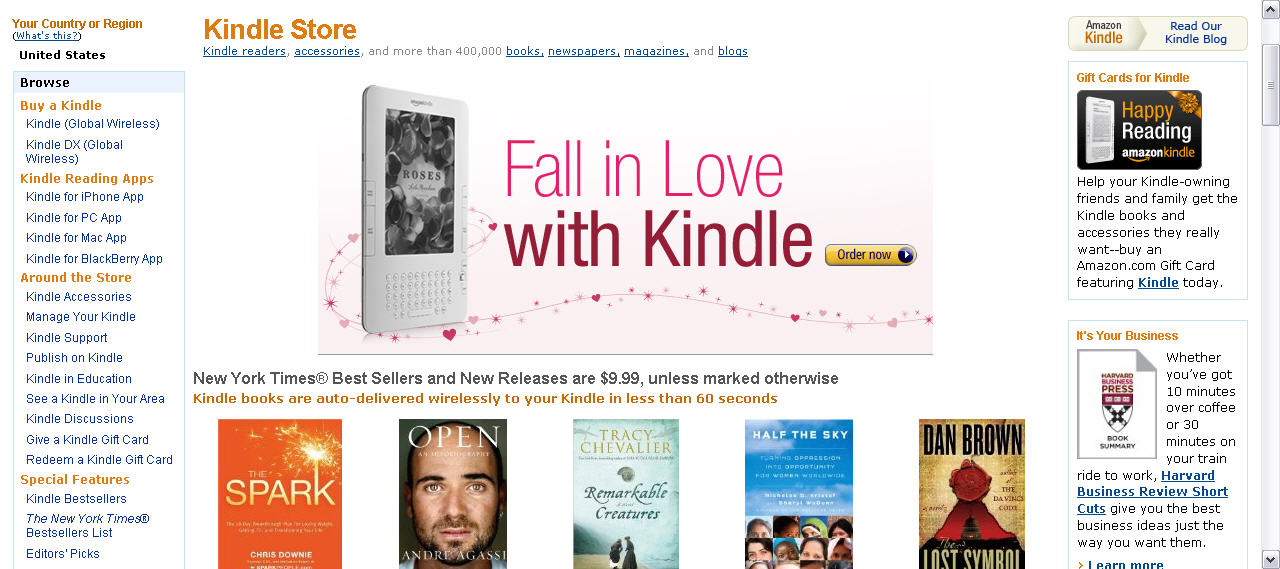Amazon losing the e-book pricing battle: Will content trump distribution?

Amazon continues to joust with book publishers over the price of e-books. The skirmish started a week ago with a showdown with Macmillan, spread to Harper Collins and now includes Hachette. These battles boil down to one question: Does content trump distribution or vice versa?
First, the background.
As noted earlier in the week, the Macmillan battle---Amazon pulled Macmillan books from the Kindle store and then capitulated on pricing---just invited other publishers to play hard ball. The battle boils down like this:
- Amazon was pricing e-books at $9.99 under a wholesale model;
- Publishers wanted an "agency" model where they dictate prices and give the distributor a cut;
- Publishers want new digital releases priced at $12.99 to $14.99 and Apple obliged with its iPad and book store;
- Now Amazon has a real problem and has to cave.
Simply put, Apple set off a lot of disruption in Amazon's model. Macmillan has ads bashing Amazon, which is kind of silly when Macmillan CEO John Sargent then pens a letter with passages like this:
Over the last few years we have been deeply concerned about the pricing of electronic books. That pricing, combined with the traditional business model we were using, was creating a market that we believe was fundamentally unbalanced. In the last three weeks, from a standing start we have moved to a new business model. We will make less money on the sale of e books, but we will have a stable and rational market...
A word about Amazon. This has been a very difficult time. Many of you are wondering what has taken so long for Amazon and Macmillan to reach a conclusion. I want to assure you that Amazon has been working very, very hard and always in good faith to find a way forward with us. Though we do not always agree, I remain full of admiration and respect for them. Both of us look forward to being back in business as usual.
News Corp. CEO Rupert Murdoch, who owns Harper Collins, piled on earlier this week on the company's earnings conference call:
Harper Collins is one of the world’s leading publishing houses with much improved profitability. There is no doubt we have been at the forefront of the global debate about the value of content. At times that debate has been intense but that was essential when the stakes were so high. Far too many content companies were passive in the face of predatory behavior and self-serving [sophistry]. Passivity and meekness are not characteristics of our company. A year ago our criticism was thought heretical. But somehow the profane has become profound and the content clan has gathered around our ideas.
As I said earlier, the value of content is now clear. Instead of the existential debate about value now we are merely haggling over valuations. Consumers want content to be delivered immediately and on a ray of devices that suit their needs and they are willing to pay to be entertained and informed.
Without content the ever larger and flatter screens, the tablets, e-readers and the increasingly sophisticated mobile phones would be lifeless. Without content these ingenious and wonderful devices would be unloved and unsold.
And then there's the email from Hachette Book Group USA CEO David Young via Media Bistro:
There are many advantages to the agency model, for our authors, retailers, consumers, and publishers. It allows Hachette to make pricing decisions that are rational and reflect the value of our authors' works.
Add it up and publishing houses want a "rational market" according to them. This rational market is the same one that music companies wanted---and lost to Apple's pricing model. Content companies learned from that and don't want Amazon to make $9.99 the e-book template.
What side of the equation should dictate pricing: Content or distribution? The tug-of-war over this question flares up repeatedly. Content companies slug it out with cable distributors over fees. NBC Universal pulled its content from Apple's iTunes for a bit---only to return and cook up Hulu. Google is duking it out with the Associated Press. Now we get the Amazon skirmish.
Simply put, content and distribution need each other. However, distribution has won the day throughout the Internet age. After all, you buy Google and Amazon shares and not newspaper stocks like Gannett and the New York Times. We've been told for years---by media titans---that content is king, but I've seen little evidence that backs the statement up.
This distribution vs. content discussion came up on the Enterprise Irregular email list. The consensus seemed to be that distribution still wins and book publishers are reacting to a shift in power away from them---just like the music industry and Hollywood. Others noted that book publishers would be better off adopting innovative models such as Tim O'Reilly's.
Is it different this time? Probably not, Amazon's distribution power may have taken a hit, but it's just a matter of time before digital content starts dictating time to market and book publishers have to speed up their publishing models. Vinnie Mirchandani, who is publishing a book, is stunned by how long it takes to bring a completed product to market. The book supply chain is a mess. Content companies can fight all they want to preserve their current models---and maybe even notch a few victories---but their ways of doing business will be disrupted by new distribution vehicles in the end.
